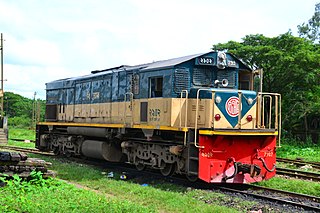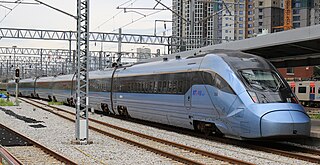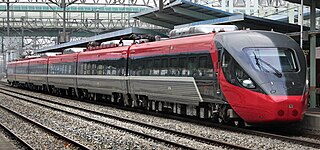
A diesel multiple unit or DMU is a multiple-unit train powered by on-board diesel engines. A DMU requires no separate locomotive, as the engines are incorporated into one or more of the carriages. Diesel-powered single-unit railcars are also generally classed as DMUs. Diesel-powered units may be further classified by their transmission type: diesel–mechanical DMMU, diesel–hydraulic DHMU, or diesel–electric DEMU.

A switcher locomotive, shunter locomotive, or shifter locomotive is a locomotive used for maneuvering railway vehicles over short distances. Switchers do not usually move trains over long distances. Instead, they typically assemble trains in order for another locomotive to take over. Switchers often operate in a railyard or make short transfer runs. They may serve as the primary motive power on short branch lines or switching and terminal railroads.

Korea Train eXpress (Korean: 한국고속철도), often known as KTX, is South Korea's high-speed rail system, operated by Korail. Construction began on the high-speed line from Seoul to Busan in 1992. KTX services were launched on April 1, 2004.

Hyundai Rotem Co. is a South Korean company that manufactures rolling stock, defense products and plant equipment. It is a part of the Hyundai Motor Group. Its name was changed from Rotem to Hyundai Rotem in December 2007 to reflect the parent company. It is also called Hyundai Railroad Technology Systems.

A hood unit, in North American railroad terminology, is a body style for diesel and electric locomotives where the body is less than full-width for most of its length and walkways are on the outside. In contrast, a cab unit has a full-width carbody for the length of the locomotive and walkways inside. A hood unit has sufficient visibility to be operated in both directions from a single cab. Also, the locomotive frame is the main load-bearing member, allowing the hood to be non-structural and easily opened or even removed for maintenance.

Rail transport in South Korea is a part of the transport network in South Korea and an important mode of the conveyance of people and goods, though railways play a secondary role compared to the road network. The network consists of 4,285 km (2,663 mi) of standard-gauge lines connecting all major cities with the exception of Jeju City on Jeju Island, which does not have railways; of the network, 2,790 km (1,730 mi) are double-tracked and 3,187 km (1,980 mi) are electrified. In 2018, rails carried 11.5 percent of all traffic in South Korea – 134.8 million passengers and 30.9 million tonnes of freight – with roads carrying 88.3 percent.

The Korail Class 8000 locomotive is a series of South Korean electric locomotives operated by Korail. This locomotive was introduced from 1972 to 1990, after electrification of several industrial lines. It was assigned both passenger and freight duty until the introduction of the 8200 series, which restricted the older locomotives to solely freight service. 94 were built, but many have been retired as new replacements enter service.

The GT26CW-2 is the Dash-2 variant of the GT26CW diesel-electric locomotive series created by the Electro-Motive Division (EMD) of General Motors for export to Iran, Israel, Morocco, Pakistan, Peru, South Korea, Turkey and Yugoslavia. Various licensees have also constructed or refurbished this model. It is similar to the highly successful SD40-2 North American locomotive.

The KTX-Sancheon is a South Korean high-speed train built by Hyundai Rotem in the second half of the 2000s and operated by Korail since March 2010. With a top speed of 305 km/h (189.5 mph), the KTX-Sancheon is the second commercial high-speed train operated in South Korea and the first domestic high-speed train that is designed and developed in South Korea.

Union Carriage & Wagon (UCW) is a rolling stock manufacturer in South Africa.

The Korean State Railway, commonly called the State Rail, is the operating arm of the Ministry of Railways of North Korea and has its headquarters at P'yŏngyang. The current Minister of Railways is Chang Jun-song.

The Korail Class 341000 trains, formerly identified as Korail Class 2000 trains, are commuter electric multiple units in South Korea used on Seoul Subway Line 4. Class 341000 trains were manufactured and delivered between 1993 and 1999 to expand service on the Gwacheon Line and the Ansan Line sections of Line 4.

Bangladesh Railway Class 2900 is, as of 2023, the most frequently used meter-gauge diesel electric locomotive of Bangladesh Railway along with Class 3000. This reliable locomotive series has been in service since 1999. Bangladesh Railway has a total 39 locomotives of this class. These 39 locomotives are being used in both passenger and freight services.

The LRTA 2000 class is a class of electric multiple units in operation on the LRT Line 2, manufactured by Rotem and Toshiba.

The KTX-Eum or Korail Class 150000 is a South Korean high-speed electric multiple unit train manufactured by Hyundai Rotem and operated by Korail. The word 'eum' in Korean means 'uniting through connection'. This name was selected by members of the public, and expresses the desire to connect regions, people, and happiness through trains.

The KTX-Cheongryong or Korail Class 160000 is a South Korean high-speed electrical multiple unit train manufactured by Hyundai Rotem and operated by Korail and SR Corporation.

The Korail Class 210000, also known as the EMU-150, is a South Korean higher-speed electrical multiple unit train manufactured by Hyundai Rotem and Woojin Industrial System Company Limited and operated by Korail on ITX-Saemaeul services since 2014.

Bangladesh Railway Class 3000 is a class of meter-gauge diesel-electric locomotives operated by Bangladesh Railway. This is the latest and most modern meter gauge locomotive class of the Bangladesh Railway. These locos could be used on broad gauge track also by changing bogies.
Woojin Industrial Systems Company Limited is a South Korean manufacturer of rolling stock including metro, electric bus, peoplemover and monorail vehicles.















